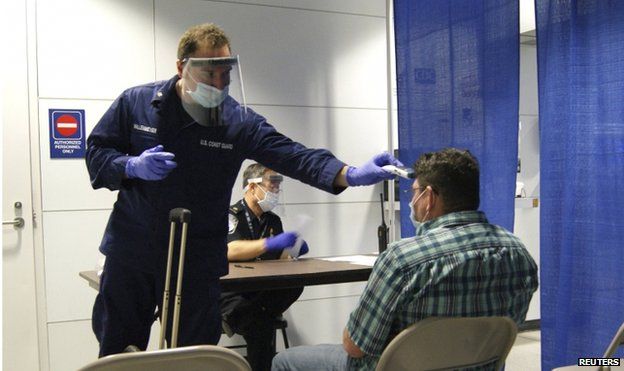Ebola: Obama 'optimistic' on virus situation in US
- Published

President Barack Obama has expressed cautious optimism about the Ebola situation in the US, as new screening rules were introduced in the country.
He said many relatives of the only known person to have died of the virus in America seemed to be out of danger.
Mr Obama said there were "modest signs" of progress in Liberia - the hardest-hit nation in West Africa.
The known death toll is now 4,877 - a rise of 322 since last week's report by the World Health Organization.
Most of the victims died in three West African nations - Liberia, Guinea and Sierra Leone.
In other developments:
- The WHO is meeting in Geneva to examine screening measures at borders and considering whether stricter travel regulations should be put in place
- First batches of an experimental vaccine against Ebola are due to arrive to Switzerland
- Doctors in Spain said a second round of tests showed Teresa Romero, who became the first person to contract Ebola outside West Africa, was completely clear of the virus
- A Cuban medical team has arrived in Liberia to join the fight against Ebola
- Doctors in the US say they no longer detect the virus in Texas nurse Amber Vinson, the second US to contract the virus from Liberian Thomas Duncan.
Archbishop warning
President Obama's comments came on Wednesday after his meeting with the head of America's newly formed Ebola response team, Ron Klain.
Tulip Mazumdar reports from Freetown where she witnessed a safe burial simulation of an Ebola victim
Mr Obama noted that relatives of Thomas Eric Duncan - the only virus victims in the US - had now been freed from quarantine in Texas.
He also said two nurses infected as a result of treating Mr Duncan "seem to be doing better".
In a separate development, new rules have now come into force requiring air passengers from Sierra Leone, Liberia and Guinea to travel via O'Hare in Chicago, JFK, Newark, Washington's Dulles or Atlanta airports, where they would undergo enhanced screening.
"The prospect of an outbreak here is very low," President Obama said.
He added that there were "modest signs of progress" in Liberia and mentioned that a declaration by WHO that Nigeria was now Ebola-free was a hopeful sign.
In Britain the Church of England's second-highest cleric, Archbishop of York John Sentamu, urged churchgoers in West Africa not to meet "in big numbers" because of the infection risk.
"Don't think that by not going to church because you are infected somehow there will be a bolt from the blue really smashing your head," he said.
- Avoid direct contact with sick patients as the virus is spread through contaminated body fluids
- Wear protective cover for eyes
- Clothing and clinical waste should be incinerated and any medical equipment that needs to be kept should be decontaminated
- People who recover from Ebola should abstain from sex or use condoms for three months
Ebola virus disease (EVD)
How Ebola survivors’ blood is saving lives
- Symptoms include high fever, bleeding and central nervous system damage
- Spread by body fluids, such as blood and saliva
- Fatality rate can reach 90% - but current outbreak has mortality rate of about 70%
- Incubation period is two to 21 days
- There is no proven vaccine or cure
- Supportive care such as rehydrating patients who have diarrhoea and vomiting can help recovery
- Fruit bats, a delicacy for some West Africans, are considered to be virus's natural host
Have you been affected by the issues raised in this story? You can email your experiences to haveyoursay@bbc.co.uk
- Published22 October 2014
- Published22 October 2014